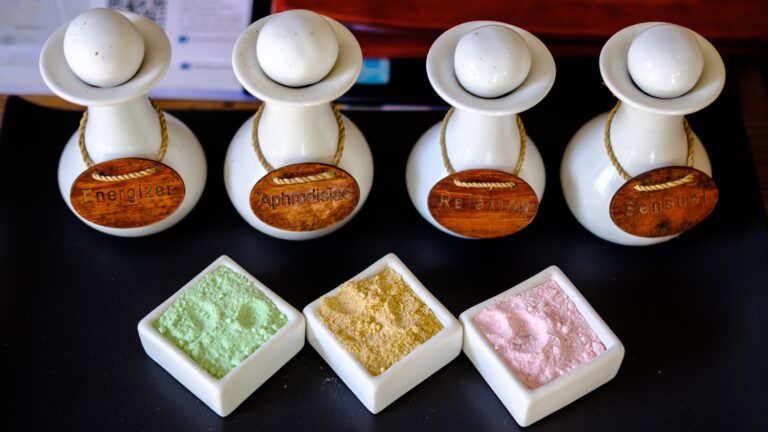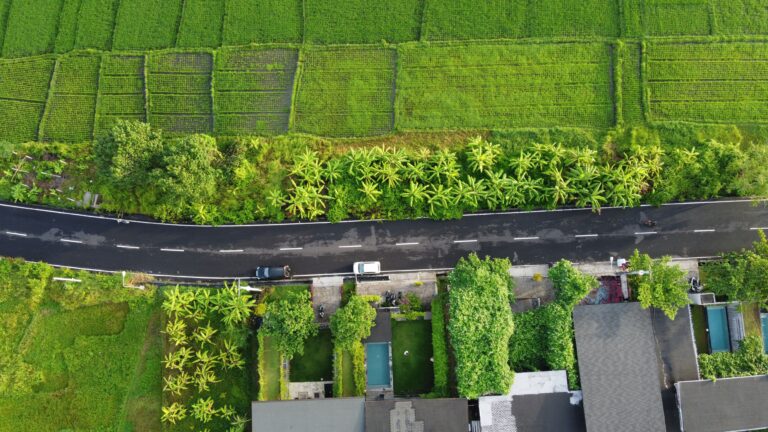One of the biggest reasons tourists from all over the world come to Bali is because, compared to other countries, it’s quite affordable to be here. You can find local meals for as little as $1 or $2. Transport on local ride-share apps (GoJek or Grab) is around $1 for a bike or $4 for a car. And accommodations can be found at hostels or guest houses for as little as $10 a night. Of course, that is for a basic backpacker budget. Bali is also known for incredible restaurants, hotels, and resorts, which will cost you considerably more. A day of sipping cocktails by the pool at FINNS can easily cost $100 per person, but we promise it will be worth it!
But when you are here, you need to know and understand the value of the local currency and how to navigate the payment systems. Not all ATMs are created equal!
Let’s go through a few basics about the Indonesian currency and the best ways to protect yourself and avoid confusion while on holiday in Bali.
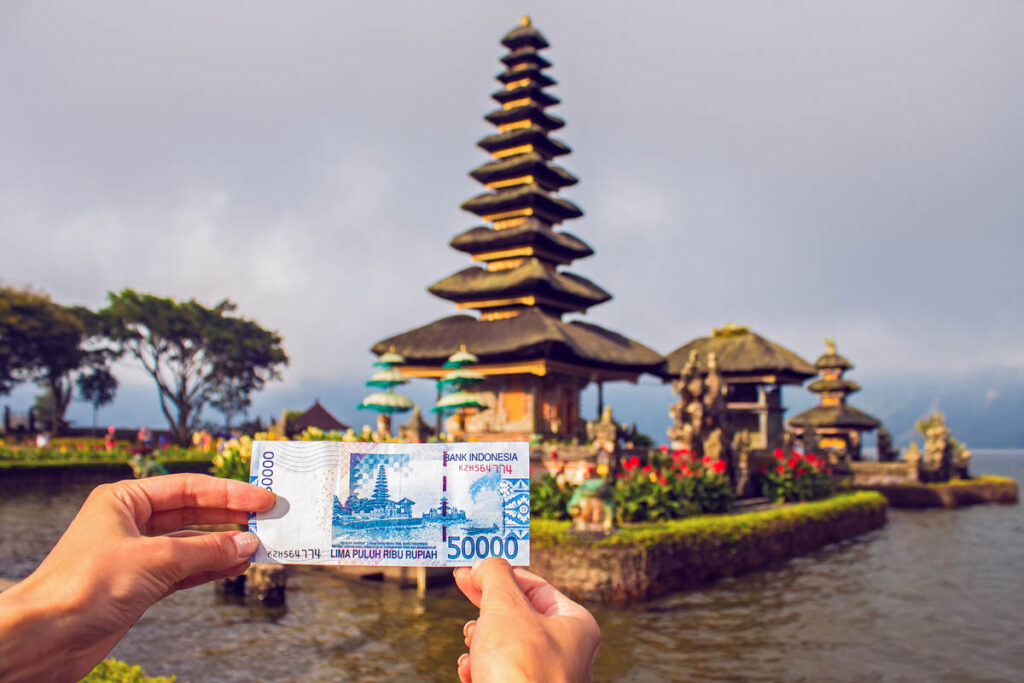
What Currency Do They Use In Bali?
Bali is famous for its culture, beaches, food, and drink, but what currency is used there? Bali is a very unique island within the archipelago of Indonesia. The religion is primarily Hindu, with its own ceremonies, rituals and traditions, within a country that is 90% Muslim. However, Bali uses the Indonesian Rupiah (IDR) as its sole currency.
Before visiting Bali, it’s best to do a quick study about the Indonesian currency. The Indonesian currency exchange rate is roughly 1 USD = 15,000 IDR and 1 AUD = 10,000 IDR. Indonesian prices will be listed in Rupiah, so for easy calculation, 2,000,000 IDR is around AUD 200.
Cash remains king in Bali!
Credit and debit cards are widespread and used in many tourist areas for restaurants, beach clubs, resorts, and shopping. However, many remote businesses and vendors may not accept credit cards for everyday payments like meals or small purchases due to a lack of internet banking.
Banknote Denomination
The Indonesian Rupiah (IDR) is the official currency in Bali. It comes as paper banknotes in denominations of 1,000, 2,000, 5,000, 10,000, 20,000, 50,000, 75,000 and 100,000. Coins are also available in 100, 200, 500 and 1000 rupiahs.
For cash and “small money”, there are coins that range from 1000 to 100 IDR and banknotes from 100,000 to 1000 IDR. It is important to note that the largest banknote, IDR 100,000, is worth only 10 AUD.
When travelling around Bali and visiting local warungs and shops, it’s wise to carry “small money” in notes of 10K, 5k or even 2k as shopkeepers often lack change for the larger denominations. Breaking large denomination notes can be quite challenging for smaller shopkeepers. It’s polite to carry small money or pay close to exact change.
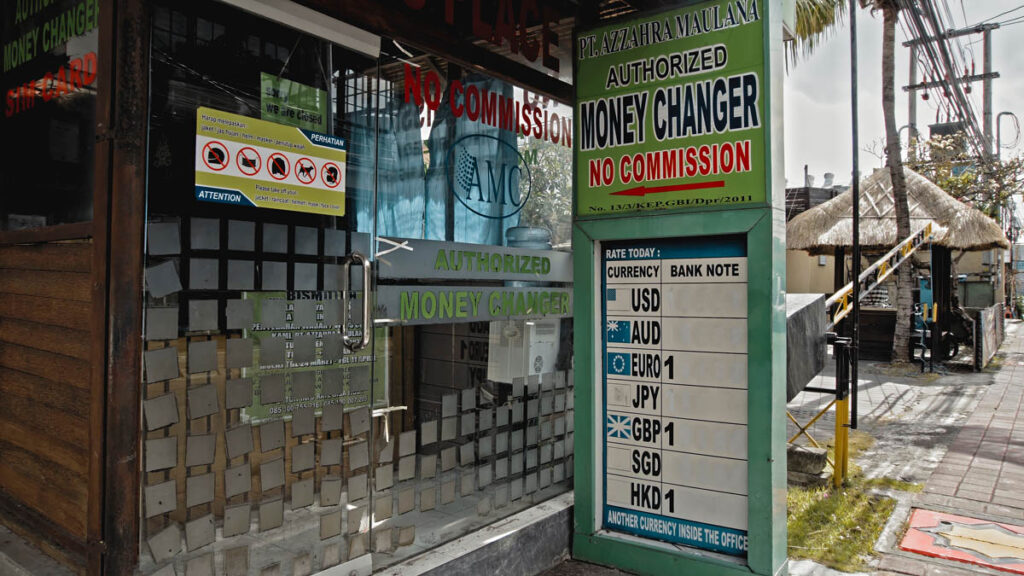
Money Changers in Bali
Check rates online or use foreign exchange apps to know the updated currency exchange rates.
You can exchange foreign currency for Indonesian Rupiah, including Australian Dollars in Bali, at the marked exchange rate without commission at various airport counters when you arrive in Bali. However, airport money changers offer much lower rates than authorised money changers. So while they are easy and convenient, you should be prepared to receive lower amounts in return. There are ATMs at the airport that will most likely offer better rates if you use your bank card at the airport for cash.
Outside the airport, you can find money exchange locations throughout Kuta, Seminyak, Legian, Canggu, and a few in Sanur and Ubud. There won’t be any in more remote areas, and you may also lack ATMs, so be prepared if you travel to more remote areas of the island. Larger hotels offer money exchange, but their rates are usually high.
Bali’s money changers exchange Euro, Pound Sterling, Singapore Dollar, US Dollar, and more in addition to the Indonesian Rupiah (IDR).
When exchanging currency, use only official and licensed money changes. Kiosks with scammers with “sleight of hand’ tactics are common.
For cash, we recommend using your bank card at ATMs wherever possible. Not only will they offer better rates than airport exchanges or hotels, but there is also less chance of being scammed when your cash is returned.
Using your bank or credit card in Bali
Notify your bank before travelling abroad. Certain banks have security features that do not allow for charges outside your home country, and your card may not work. Notify your bank of travel destinations and dates beforehand to ensure your card works in Bali.
It is possible to use credit and debit cards in most Bali establishments within tourist hotspots. Most Bali banks accept Visa, Master Card, and American Express. Restaurants, hotels, shops, and more have at least one credit card reader; if they don’t, ATMs are usually nearby.
When travelling, wherever you go, there are a few things to keep in mind before using your card to avoid surprises or additional fees.
Transaction Fees
Some businesses charge transaction fees for banking, credit, or foreign cards. They will, or should, alert you to this before charging the total to your card. However, your card may also have additional transaction fees, including a Foreign Exchange Conversion fee.
Before visiting Bali, ask your bank or research these fees to know what to expect when using your bank card. ATM fees for overseas card withdrawals can reach 10% of the withdrawal amount.
Withdrawing cash from your card
Some banks offer fee-free ATM withdrawals for overseas use, making it easy to access funds abroad. Check your bank’s ATM fees before travelling to avoid adding extra fees to your statement.
You may not be able to use every ATM, but you can find ones supported with a matching Visa or Mastercard symbol, depending on your card’s credit support.
ATMs usually carry 50k or 100k notes and can dispense 20-30 bills, depending on the brand and bank.
Before leaving for your travels, note the account withdrawal daily limit and closely monitor your balance. Researching the daily withdrawal limits in your destination will help prevent sudden changes from being flagged as suspicious.
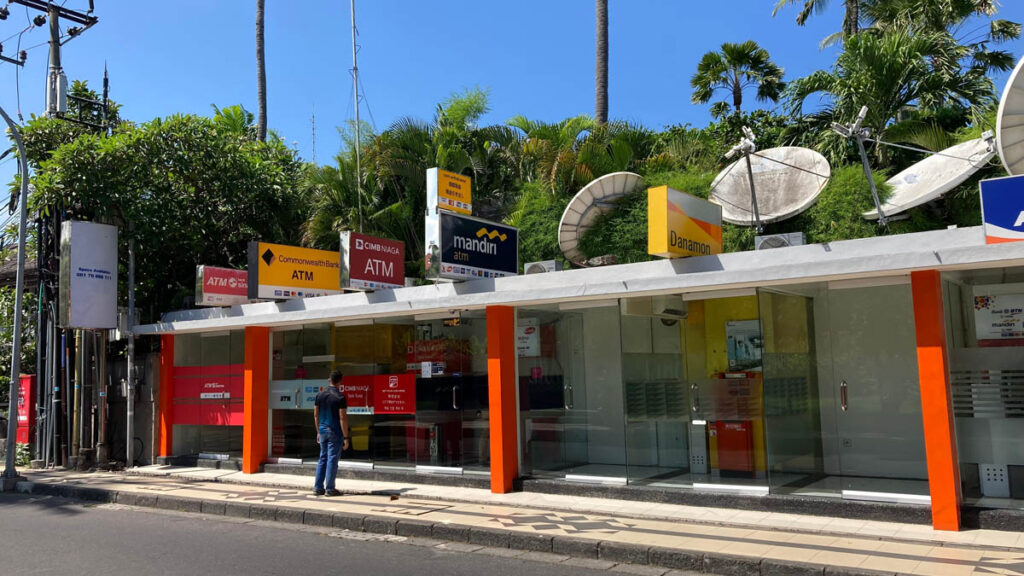
Exchange Rates when using cards
Research bank sites or official currency exchange sites to find the real-time exchange rates for foreign currency. This will help you make purchases in Bali to understand the total cost of goods or services and the charges you can expect on your credit card bill or bank statement.
Be careful when using dynamic currency conversion (DCC), which allows merchants to accept payments in foreign currencies. These conversion rates can often be very high, so unless you are certain of the rates, it’s best to avoid this when possible and request the charge in IDR.
If you lose your bank card in Bali
Losing your wallet, bank or credit card is unfortunate and stressful when travelling. Maybe you have misplaced your card, dropped your wallet, left a bag in a cab or at a restaurant, or an ATM swallowed or “ate” your card. These things do happen, but if you plan ahead, it doesn’t have to ruin your holiday.
Alternative methods of payment.
Firstly, plan ahead and, if possible, have a backup form of payment. This could be an emergency credit card or cash you keep locked in your hotel safe or a secure place at your accommodation.
Notify your bank.
If you lose your card, immediately notify your bank so they can put a temporary hold on your card or cancel it to avoid any additional charges. If your bank does not have a local branch in Bali, it is unlikely that you will be able to get a replacement card. Some banks will mail a new card to Bali, but it could take days or weeks to arrive.
Western Union wire transfers.
Many banks will allow you to wire money through Western Union to pick it up at a local branch in an emergency. If your bank doesn’t have that, you can ask a friend or family member to wire you some money.
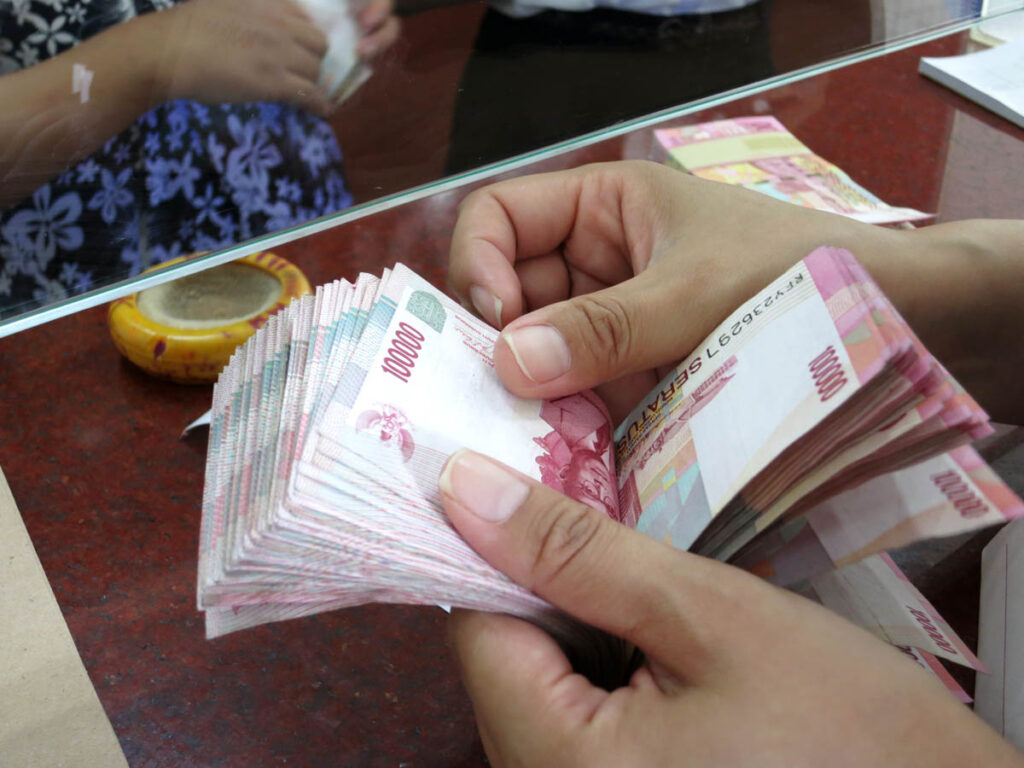
Common mistakes and money traps to avoid in Bali
We’ve noted a few recommendations above, but we’ll summarise the most common mistakes that travellers in Bali can make that lead to additional, higher, and unexpected costs.
- Not checking your card’s fees and terms of service. Pre-planning and a little research can save you money, stress, and surprises on your credit card and bank statements.
- Airport money exchanges. While they are convenient and quick, that ease of service comes with hefty fees and lower exchange rates. For grabbing cash fast at the airport, it’s best to use ATMs for the best rates.
- Not having cash. While you can use your card almost everywhere, you can be charged transaction fees at the establishment, especially when using a foreign card. Always be aware of your card’s transaction fees, as you may be charged fees by the establishment and your bank.
- Paying in foreign currency. When given a choice, always choose to pay in IDR. Foreign currency exchange rates may use dynamic currency exchange, with higher currency conversion fees and lower rates.
- Having too much cash on you. As we said earlier, the largest banknote in Indonesia is only worth USD 8 or AUD 10. So even with small withdrawals, you have a full wallet! But you don’t need a lot of cash in Bali. Getting around and eating is relatively cheap, so if you withdraw a large sum of cash, over AUD 100, don’t carry it all with you. Ensure you have enough cash for your day and leave the rest secured at your accommodation.
- Using the ATM too many times. If your card has ATM fees, try to limit your ATM visits. ATM fees add up quickly. The fees may seem small, but keep in mind that the ATM also charges a fee. Keeping your ATM visits to just a few can help save you from costly surprises on your bank statement later.
Money tips when travelling in Bali
Before you come to Bali, a little research or planning can help save you from additional fees, stress, or common money traps or scams. You can check your local currency rates online or use them on foreign exchange apps. Talk to your bank before travelling so that you know your card’s withdrawal limits and any additional fees.
Cash is the preferred payment method in Bali, so it’s best to carry enough to enjoy your day, including smaller denominations or change for local shopkeepers and warungs.
Ask our reservations team if you have any questions about prices or estimates or day trips, airport transfers, drivers, and how much to expect to pay for activities in Bali.
Share this entry





